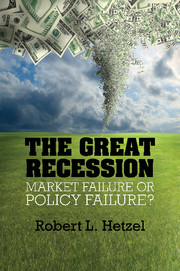Book contents
- Frontmatter
- Contents
- Figures
- Tables
- Preface
- One The 2008–2009 Recession
- Two Recessions
- Three The Great Contraction
- Four Monetary Policy and Bank Runs in the Great Depression
- Five Vigorous Recovery and Relapse
- Six Interwar International Monetary Experiments
- Seven Identifying the Shocks that Cause Recessions
- Eight From Stop-Go to the Great Moderation
- Nine Controlling Bank Risk Taking
- Ten The Housing Crash
- Eleven Bubble Trouble
- Twelve What Caused the Great Recession of 2008–2009?
- Thirteen What Caused the Great Leverage Collapse?
- Fourteen The Distinctions Between Credit, Monetary, and Liquidity Policy
- Fifteen Fed Market Interventions
- Sixteen Evaluating Policy
- Seventeen The Business Cycle
- Eighteen Why Is Learning So Hard?
- Nineteen How Should Society Regulate Capitalism?
- Postscript
- Bibliography
- Index
Preface
Published online by Cambridge University Press: 05 May 2012
- Frontmatter
- Contents
- Figures
- Tables
- Preface
- One The 2008–2009 Recession
- Two Recessions
- Three The Great Contraction
- Four Monetary Policy and Bank Runs in the Great Depression
- Five Vigorous Recovery and Relapse
- Six Interwar International Monetary Experiments
- Seven Identifying the Shocks that Cause Recessions
- Eight From Stop-Go to the Great Moderation
- Nine Controlling Bank Risk Taking
- Ten The Housing Crash
- Eleven Bubble Trouble
- Twelve What Caused the Great Recession of 2008–2009?
- Thirteen What Caused the Great Leverage Collapse?
- Fourteen The Distinctions Between Credit, Monetary, and Liquidity Policy
- Fifteen Fed Market Interventions
- Sixteen Evaluating Policy
- Seventeen The Business Cycle
- Eighteen Why Is Learning So Hard?
- Nineteen How Should Society Regulate Capitalism?
- Postscript
- Bibliography
- Index
Summary
Preface
Prior to the 2008–2009 recession, considerable professional consensus existed that a prolonged, deep recession required contractionary monetary policy. With the 2008–2009 recession, this consensus disappeared. Popular and professional discourse revived the view that dominated thinking in the nineteenth century and first half of the twentieth century. According to this view, the business cycle derives from excessive swings in risk taking by investors. Although popular expressions of this view ignore the operation of the price system, the implicit assumption is that these fluctuations in investor sentiment between optimism and pessimism overwhelm the ability of the price system and, especially, the real interest rate to maintain full employment.
In contrast to this market-disorder view, the monetary-disorder view is that the price system works well to equilibrate the economy, provided that money creation and destruction do not prevent the interest rate from adjusting. There is no inevitable movement from boom to bust. This view receives empirical content from the hypothesis that to prevent the monetary emissions and absorptions that destabilize the price level, the central bank must follow a rule that provides for a stable nominal anchor and that allows market forces to determine the real interest and, by extension, other real variables (Hetzel 2008b).
- Type
- Chapter
- Information
- The Great RecessionMarket Failure or Policy Failure?, pp. xiii - xivPublisher: Cambridge University PressPrint publication year: 2012



